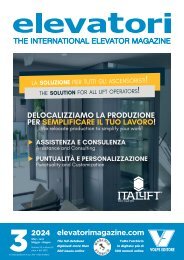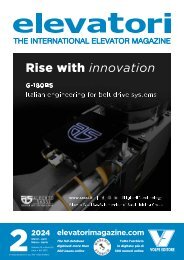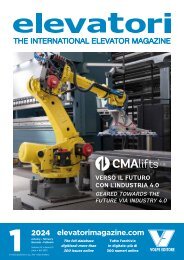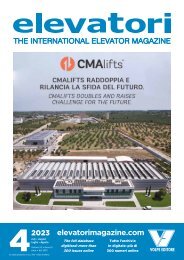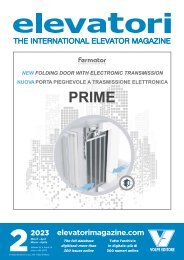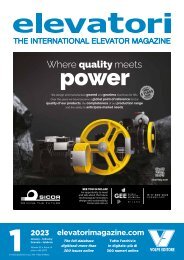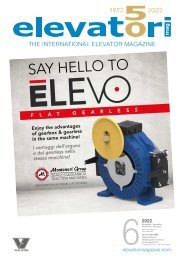Elevatori Magazine 3-2023
May - June 2023
May - June 2023
You also want an ePaper? Increase the reach of your titles
YUMPU automatically turns print PDFs into web optimized ePapers that Google loves.
(9%). It is no coincidence, in fact, that 90% of<br />
the sample consider the help of an experienced<br />
professional to best manage the generational<br />
transition to be essential.<br />
However, the situation changes radically when<br />
heirs receive training in line with their new role,<br />
such as gaining experience in other companies<br />
or holding non-peer positions in all company<br />
divisions in order to get to know the company<br />
in depth: in this case, according to 83% of<br />
managers, the new figure has proven to be suitable<br />
to take the reins of the company, with the rating<br />
equalling that of predecessors (7.2 vs 7.5). As a<br />
result, the companyʼs performance also benefited:<br />
for 87% of the managers, in fact, the companyʼs<br />
overall situation was stable or improved (only<br />
for 13% did it worsen), as did turnover, where<br />
only 16% experienced a drop. Employee relations<br />
and management also improved, but above all<br />
the quantum leap came from the higher level<br />
of innovation introduced by the new figures,<br />
indicated by almost six out of ten managers.<br />
Why do entrepreneurs leave? The main reason is<br />
age (for 47% of the sample), which happens on<br />
average at the age of<br />
70. But there are also<br />
those who have done<br />
so because of general<br />
tiredness (30%), under<br />
pressure from children/<br />
family (24%), forced<br />
by health problems<br />
(18%) or premature<br />
death (6%).<br />
Space therefore goes to<br />
the ʻyoungʼ. But is this<br />
always the case? The<br />
reality is quite different.<br />
Hardly ever does the<br />
newly ʻretiredʼ leave the leadership of the company<br />
entirely to his successor: according to managers,<br />
40% of entrepreneurs continued to enter the<br />
companyʼs decision-making process in a major way<br />
and 39% on an occasional basis. Perhaps due to a<br />
lack of trust in the heir, only slightly more than one<br />
in five steps aside completely.<br />
The reasons for the inadequacy, however, are to<br />
be sought not only in the entrepreneurial skills<br />
of the successors, but also upstream, i.e. in the<br />
lack of planning for the passing of the baton,<br />
which must be carefully prepared and studied<br />
well in advance, right from the time of study. And<br />
this is where the first shortcomings emerge: only<br />
15% of entrepreneurs have planned a succession<br />
plan well in advance, directing family members<br />
towards paths in line with the position they are to<br />
hold. And only 41% rely on experienced external<br />
managers, while in more than half of the cases it<br />
is managed directly by the entrepreneur without<br />
the help of outsiders (39%) or at most with<br />
the support of a trusted but non-expert person<br />
(16%).<br />
When considering work experience, in fact,<br />
chi ha dovuto cessare l’attività (9%). Non è un<br />
caso, infatti, che il 90% del campione ritiene<br />
fondamentale l’aiuto di un professionista esperto<br />
per gestire al meglio il passaggio generazionale.<br />
Tuttavia, la situazione cambia radicalmente quando<br />
i familiari eredi ricevono una formazione in linea<br />
con il loro nuovo ruolo, come fare esperienze in<br />
altre aziende o ricoprire incarichi non apicali in<br />
tutte le divisioni aziendali per conoscere a fondo<br />
l’impresa: in questo caso, secondo l’83% dei<br />
manager, la nuova figura si è dimostrata adatta a<br />
prendere le redini della società, con il giudizio che<br />
eguaglia quello dei predecessori (7,2 contro 7,5).<br />
Di conseguenza, anche le performance dell’impresa<br />
ne traggono beneficio: per l’87% dei manager,<br />
infatti, la situazione aziendale a livello generale è<br />
stabile o migliorata (solo per il 13% è peggiorata),<br />
così come il fatturato, dove solo il 16% ha avuto un<br />
calo. Migliora anche il rapporto e la gestione dei<br />
dipendenti, ma soprattutto il salto di qualità viene<br />
dal più alto livello di innovazione introdotto dalle<br />
nuove figure, indicato da quasi sei manager su dieci.<br />
Perché gli imprenditori lasciano? La motivazione<br />
principale è l’età (per il 47% del campione), che<br />
avviene mediamente<br />
a 70 anni. Ma c’è<br />
anche chi lo ha fatto<br />
per una questione di<br />
stanchezza generale<br />
(30%), su pressione<br />
dei figli/familiari<br />
(24%), costretto da<br />
problemi di salute<br />
(18%) o da morte<br />
prematura (6%).<br />
Spazio quindi ai<br />
ʻgiovaniʼ. Ma è sempre<br />
così? La realtà è ben<br />
diversa. Difficilmente<br />
il neo ʻpensionatoʼ lascia totalmente la guida<br />
dell’azienda al suo successore: secondo i manager,<br />
il 40% degli imprenditori ha continuato a entrare<br />
nelle scelte aziendali in modo importante e il<br />
39% in modo saltuario. Forse a causa della scarsa<br />
fiducia nell’erede, solo poco più di uno su cinque<br />
si fa completamente da parte.<br />
Le ragioni dell’inadeguatezza vanno però<br />
ricercate non solo nelle capacità imprenditoriali<br />
dei successori, ma anche a monte, ovvero<br />
nella mancata pianificazione del passaggio del<br />
testimone che deve essere preparata e studiata<br />
attentamente con largo anticipo, sin dagli studi.<br />
E su questo emergono le prime lacune: solo il<br />
15% degli imprenditori ha pianificato con netto<br />
anticipo un piano di successione, indirizzando i<br />
familiari verso percorsi in linea con la posizione<br />
che andranno a ricoprire. E solo il 41% si<br />
affida a manager esterni esperti, mentre in oltre<br />
la metà dei casi viene gestito direttamente<br />
dall’imprenditore senza l’aiuto di persone esterne<br />
(39%) o al massimo con il supporto di una<br />
persona di fiducia ma non esperta (16%).<br />
Se si considerano le esperienze lavorative, infatti,<br />
<strong>2023</strong> MAY | JUNE • MAGGIO | GIUGNO <strong>2023</strong><br />
ELEVATORIMAGAZINE.COM<br />
67




